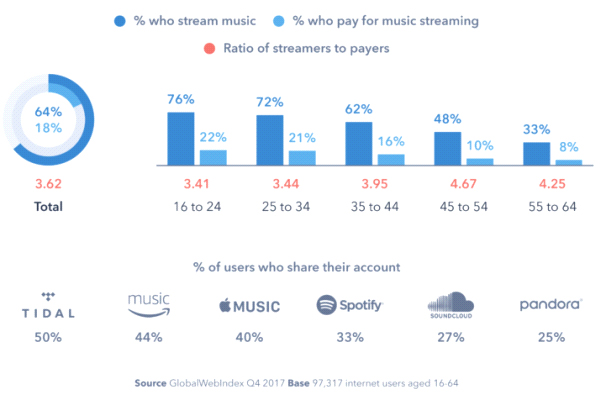April 25, 2018
Paid music services are gradually becoming the long-term growth saviour for one of the biggest tech conglomerates in the world; Apple.
In the March report on the company’s first-quarter revenue, it was revealed that the sales of iPhones have already hit a plateau. In fact, declining sales of the iPhone X have resulted in slight losses in its stock value.
The report, however, was not all gloomy, showing clear signs that there has been a significant value increment in the monetised services of the company. In this regards, Katy L. Huberty, equity research analyst and managing director at Morgan Stanley, has said “over the last five years, the vast majority (86%) of Apple’s 8% annual revenue growth was driven by iPhone sales, it is through monetization of Apple’s Services business that we see the company still generating mid-single-digit revenue growth.”
Another senior analyst from Macquarie Group, Ben Schachter, states that out of these services, Apple Music is going to be a leading source of revenue. He believes that by the year 2020, it could account for almost 15% of its total revenue through such services.

It is noteworthy, that despite not being an independent premium music service provider like Pandora Radio and Spotify, Apple Music is gradually reaching their equivalent numbers of paid users.

At present, Apple Music has over 40 million paying subscribers, and this number is all set to increase in the near future if we take into account the growth spurt it has witnessed since last September when it had only 30 million listeners with premium accounts. Furthermore, as per the analytical views of UBS analyst Steven Milunovich, 90% of all customers who have shown interest in spending money on paid services, purchase another from the same provider within the period of twelve months.
Seemingly, Apple already has found a candidate for its saviour in the winters. However, this service is showing significant traits of a lead contributor at present, to raise the bottom line of the company’s value. In fact, despite being 15% contributor to the total service revenue, Apple Music will only account for the 3.4% of its total profit amount from services.
This calls for a redefinition of what the company is selling under the title of its premium services. This conclusion is not limited to Apple either. The fourth quarter stats revealed by Global Web Index, the ratio between paid listeners and freemium users of leading music service providers,shows a remarkable gap. This gap becomes more conclusive when joined with the data from demographics.

It is evident that paid music services are becoming an increasingly lucrative model for the many businesses involved in it, but sensing the expectations of the different sections of users, who prefer having outright music ownership over having seamless access to streaming music, it is clear that some changes in the model are inevitable for any business looking for a long-term investment in the service.
Resources:
https://arabianmarketer.ae/data-point-music-streaming-yet-to-prove-premium-worth/